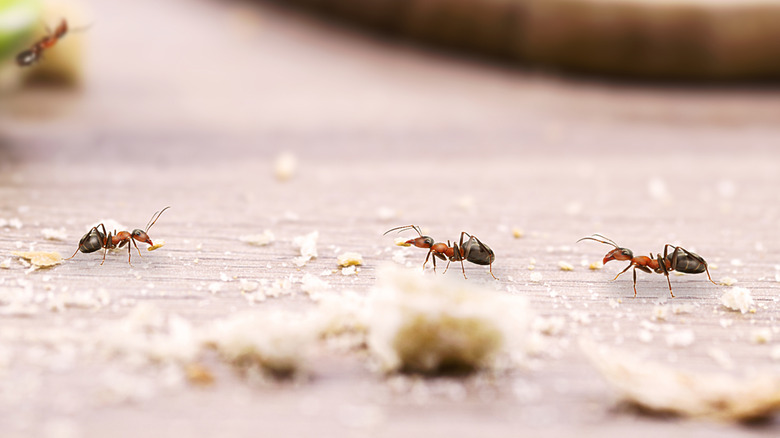Clean This Overlooked Area With Vinegar To Keep Out Ants
If you've spotted a trail of ants weaving through your kitchen, you're probably not thrilled about it. What many homeowners don't realize is that ants often sneak in through areas we rarely think to clean, such as window sills, door jambs, baseboards, and even corners near trash bins or under cabinets. These overlooked spots are prime real estate for pests. Maybe you're too busy to call an exterminator, don't feel like running to the store to stock up on sprays and traps, or are looking for a way to repel bugs naturally. The good news is you might already have the solution sitting in your pantry: distilled white vinegar.
Many people already use vinegar to keep their houses clean, but it also happens to double as a natural ant repellent. Since ants rely heavily on scent trails to navigate and communicate with their colony, vinegar's strong smell disrupts those trails and sends them packing. Even better, it's totally chemical-free, pet-safe (when diluted), and easy on the wallet.
For this hack, you'll need distilled white vinegar (or apple cider vinegar), water, a spray bottle or sponge, and paper towels. To put it into action, mix equal parts distilled white vinegar and water in a spray bottle or small bowl and wipe down door frames, window sills, baseboards, counters, and any other areas where you've seen ants lurking. Don't forget spots like the garbage can area or pet food bowls. Ants love easy access to food and moisture. Not only will your home feel clean, but you'll also send those ants packing without a single harsh chemical in sight.
Why Vinegar Works (and How to Make It Even More Effective)
So why does vinegar work so well against ants? The secret lies in its strong acidity and overpowering scent (two things ants absolutely hate.) Their scent-based communication systems get thrown off completely, and the acidity interferes with their ability to return to a food source. Bonus: Vinegar also repels other pests like fruit flies and spiders, making it a great all-around natural deterrent. That being said, this DIY is more of a deterrent. For an equal punch, you can swap out white vinegar for apple cider vinegar, which has a slightly sweeter smell that still throws ants off track. You can also add a few drops of essential oils, like peppermint, tea tree, or eucalyptus, to boost the repelling power and make the solution smell a little less harsh to you.
Since ants gravitate toward neglected, tight openings and entryways, wiping down those specific zones regularly with vinegar can cut down their traffic. It's worth noting this method won't poison ants the way commercial products do, and it won't get to the root of an infestation, but it will work as a strong repellent and block their pheromones. It's much safer for homes with kids, pets, or people with sensitivities to strong chemicals. Keep in mind you'll have to reapply this because it's no longer effective when the scent is gone. If you want to customize your vinegar solution, you can try incorporating other scents that ants hate, such as cinnamon, citrus, and black pepper. For more cleaning tips, here's how vinegar can be a versatile cleaning tool.

